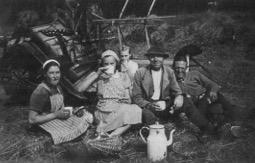On the search for clues - NS crimes against forced labourers and prisoners of war in a village in Sauerland

Since 1939, forced labourers had also been working in Garbeck. “The whole village was full”, said Rita Prior: “On farms, in factories; there were foreign workers everywhere. The French were in the Gransauer mill, Soviet prisoners of war were in the lime works.” Forced labourers also worked in private houses. The dining room of a restaurant in the centre of the village was initially used as accommodation. At the beginning, most Poles took part in Sunday mass in church. “The first forced labourers came to Garbeck at the beginning of the war, first from Poland and then, after the Russian campaign, from the Ukraine, Russia, Belarus, Lithuania, Latvia, Estonia”, recounted the retired builder Liborius Hemeier (born 1931): “They were generally referred to as Russians. Women and girls were also used here as forced labourers, in the factories as well - at Heinrich Honert, Hubert Waltermann and Josef Keggenhoff. At first, they were all housed in the Gransauer mill and were given their meals there too. Afterwards, Honert had his forced labourers at Levermann’s. Sleeping quarters were set up in the old office rooms. Later, Hubert Waltermann built a barracks at the factory.”
An entry by Pastor Schulte in the parish book provides an insight into the situation of the Polish forced labourers in the village in which all were Catholic apart from one family: “They were housed in the dining room at the Syre restaurant and each day they were allocated to the individual enterprises. In autumn 1940, the camp was abolished and a new one was set up at the lime works. We were not able to provide pastoral care to the occupants because we were refused entry. During 1940, the prisoners of war were replaced by civilian workers from Poland. They lived in the houses in which they had found work. These people were initially allowed to take part in worship within the community. Many but not all Poles attended Sunday mass. In September 1940, a police order was issued which categorically forbade the Poles from taking part in community worship. And although separate church services were permitted, the police had to be notified beforehand. In July 1941, a ministerial declaration was published which again forbade people from taking part in church services because very unwelcome phenomena had come to light.” [12]
The NS leadership considered that the use of foreign labourers endangered the ideological foundations of National Socialism. To combat the threat posed to “race” and “nationality” by “foreign races”, the Reich government issued a whole series of discriminating decrees that further restricted the life of Polish labourers. The so-called “Polish decrees” reinforced and radicalised the racist concepts of “Slavic sub-humans” and “racially superior” Germans. Contact with “Eastern workers” was to be limited to working relationships.[13] The 1940 leaflet “Responsibilities of civilian workers of Polish origin during their stay in the Reich” dictates the following: “(...) Leaving the place of residence is strictly prohibited. During curfews ordered by the police authorities, accommodation must not be left either. Public transport, e.g. railways, may only be used with the special authorisation of the local police authority. All workers of Polish origin must always wear the badge provided to them on the right side of the chest of each item of clothing so that it is visible at all times. The badge must be firmly sewn onto each item of clothing. Anyone who works carelessly, downs tools, incites other workers, leaves the workplace without authorisation etc. will be sentenced to forced labour in a concentration camp. Any acts of sabotage or other serious infringements of work discipline will be punished severely, with at least several years in a work education camp. All social interaction with the German people, particularly visits to theatres, cinemas, dances, restaurants and churches together with the German people, is forbidden. Dancing and alcohol consumption is permitted in restaurants specially allocated to Polish workers. Anyone having sexual intercourse with a German woman or a German man or making indecent advances to them will be sentenced to death.”[14]
[12] Private collection of Johannes Waltermann, Garbeck
[13] Ulrich Herbert, Fremdarbeiter, Bonn 1985
[14] Münster State Archive, Primavesi Collection 363



